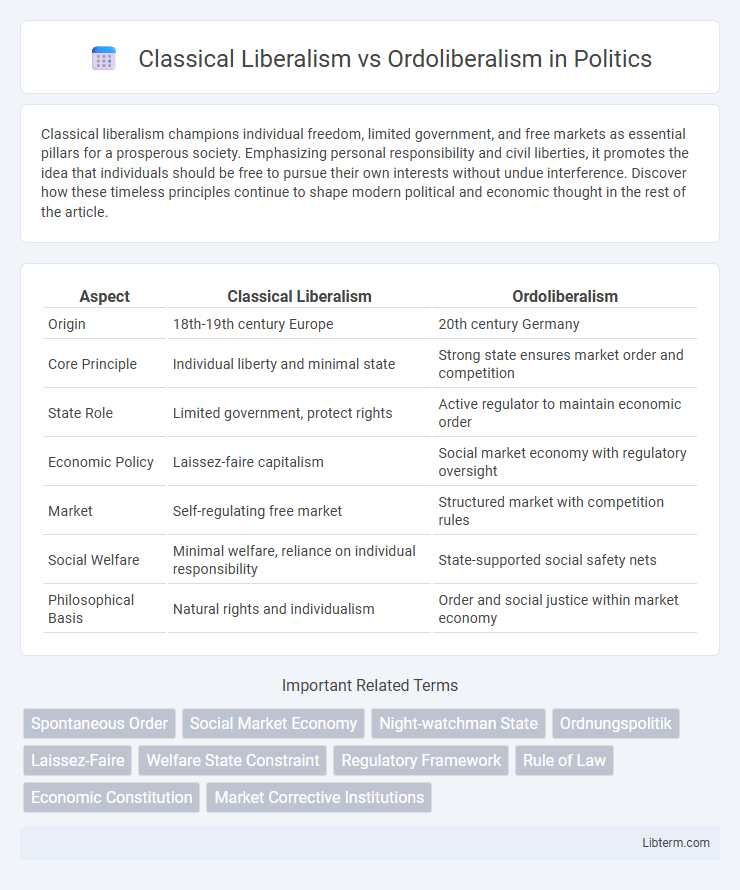Classical liberalism champions individual freedom, limited government, and free markets as essential pillars for a prosperous society. Emphasizing personal responsibility and civil liberties, it promotes the idea that individuals should be free to pursue their own interests without undue interference. Discover how these timeless principles continue to shape modern political and economic thought in the rest of the article.
Table of Comparison
| Aspect | Classical Liberalism | Ordoliberalism |
|---|---|---|
| Origin | 18th-19th century Europe | 20th century Germany |
| Core Principle | Individual liberty and minimal state | Strong state ensures market order and competition |
| State Role | Limited government, protect rights | Active regulator to maintain economic order |
| Economic Policy | Laissez-faire capitalism | Social market economy with regulatory oversight |
| Market | Self-regulating free market | Structured market with competition rules |
| Social Welfare | Minimal welfare, reliance on individual responsibility | State-supported social safety nets |
| Philosophical Basis | Natural rights and individualism | Order and social justice within market economy |
Introduction to Classical Liberalism and Ordoliberalism
Classical liberalism emphasizes individual liberty, limited government, and free markets as the foundation for economic and political systems, advocating minimal state intervention to ensure personal and economic freedoms. Ordoliberalism, a German variant, stresses the importance of a strong regulatory framework where the state ensures market competition and prevents monopolies, balancing free-market principles with social stability. Both theories prioritize economic freedom but differ on the extent and role of government in maintaining order and preventing market failure.
Historical Origins and Development
Classical Liberalism emerged in the 17th and 18th centuries, rooted in Enlightenment ideas promoting individual freedom, limited government, and free markets, exemplified by thinkers such as John Locke and Adam Smith. Ordoliberalism developed in early 20th-century Germany as a response to the economic instability during the Weimar Republic, emphasizing a strong legal framework to ensure competitive markets and prevent monopolies. While Classical Liberalism champions minimal state intervention, Ordoliberalism advocates for state-guaranteed order within the economy to sustain liberal principles in a social market context.
Core Principles of Classical Liberalism
Classical Liberalism emphasizes individual liberty, limited government, free markets, and the rule of law as foundational principles that ensure personal freedom and economic efficiency. It advocates for minimal state intervention, promoting private property rights and voluntary exchange to drive innovation and prosperity. Classical Liberalism prioritizes protecting civil liberties and maintaining a legal framework that supports competition without excessive regulation.
Fundamental Tenets of Ordoliberalism
Ordoliberalism emphasizes a strong regulatory framework to ensure competitive markets and prevent monopolies, distinguishing it from Classical Liberalism's preference for minimal state intervention. Its fundamental tenets include the establishment of a legal order that maintains market competition, the role of the state in shaping economic conditions without direct control over businesses, and the commitment to social welfare within a free-market system. This framework aims to balance individual freedom with social equity by enforcing rules that promote economic stability and prevent abuses of market power.
Role of the State: Contrasting Perspectives
Classical liberalism advocates for a minimal state primarily focused on protecting individual liberties and property rights, emphasizing free markets and limited government intervention. Ordoliberalism supports a more active regulatory role, asserting that the state must establish a robust legal framework to ensure competitive markets and prevent monopolies, thereby maintaining economic order. This key divergence reflects classical liberalism's preference for market self-regulation versus ordoliberalism's emphasis on state responsibility in designing and enforcing the economic order.
Economic Policy and Market Regulation
Classical Liberalism emphasizes minimal state intervention, advocating for free markets and individual economic freedoms as drivers of growth and innovation. Ordoliberalism supports a strong regulatory framework to ensure competitive markets and prevent monopolies, positing that the state must actively create conditions for fair competition. Economic policy under Ordoliberalism involves rules-based governance and social market principles, contrasting with the laissez-faire principles central to Classical Liberalism.
Views on Individual Freedom and Social Order
Classical liberalism emphasizes individual freedom as paramount, advocating minimal state intervention to ensure personal liberty and free markets function without constraint. Ordoliberalism balances individual freedoms with a strong regulatory framework to maintain social order and prevent market abuses, asserting that state oversight is necessary to sustain competition and protect societal stability. While both value freedom, classical liberalism prioritizes laissez-faire principles, whereas ordoliberalism stresses the state's role in creating a legal environment that supports both freedom and social cohesion.
Influence on Modern Economic Systems
Classical liberalism emphasizes free markets, individual liberty, and limited government intervention, directly shaping neoliberal economic policies and laissez-faire capitalism in modern economies. Ordoliberalism, originating from the Freiburg School, advocates for a strong regulatory framework to ensure competitive markets and prevent monopolies, significantly influencing the social market economy model in Germany and the European Union's regulatory approach. The integration of classical liberalism's market freedom with ordoliberalism's regulatory oversight creates a balanced economic system promoting both innovation and social stability.
Critiques and Contemporary Relevance
Classical liberalism faces critique for prioritizing individual freedoms at the expense of social equity, often neglecting market failures and wealth disparities. Ordoliberalism addresses these issues by advocating a strong regulatory state to ensure fair competition and prevent monopolies while maintaining market efficiency. Contemporary relevance lies in ordoliberalism's influence on European economic policies, promoting balanced growth through legal frameworks that temper laissez-faire tendencies of classical liberalism.
Conclusion: Key Differences and Lasting Impact
Classical Liberalism emphasizes individual freedom, limited government, and free-market capitalism, advocating minimal state intervention to foster economic growth and personal liberty. Ordoliberalism, rooted in German economic thought, stresses the importance of a strong legal framework and regulatory oversight to ensure fair competition and prevent market abuses while maintaining social welfare. The lasting impact of Classical Liberalism lies in its promotion of personal and economic freedoms globally, whereas Ordoliberalism significantly influenced post-war European social market economies by balancing free markets with regulatory order.
Classical Liberalism Infographic

 libterm.com
libterm.com